EmailTooltester is supported by readers like yourself. We may earn a commission when you purchase through our links. Of course, this won't increase the cost for you.
A customer relationship management (CRM) software can be a lifesaver in tracking and closing deals — but only if its data is accurate.
Because of the multiple touchpoints involved in a sale, you’d need to regularly update your CRM with info such as:
- Ongoing deals and their respective statuses
- Your latest correspondences with contacts
- The tasks and deals that your team members have been assigned to handle
Falling behind on such updates can cause your sales and marketing teams to work with outdated or missing information, negatively impacting their ability to make a sale.
But since manually keeping your CRM updated can be a lot of work, I highly recommend investing in a CRM with automation — in other words, a CRM that can automatically update itself in response to certain events.
There are many such automated CRM tools in the market, but enterprise-level CRMs like Salesforce are probably overkill unless you’re a large corporation.
So instead, I’m going to zoom in on some of the top CRMs with automation — nine of them, to be exact — for small to medium-sized businesses and what each tool can bring to the table. Keep reading to check them out!
What Are the Benefits of a CRM with Automation?
By helping to automatically take care of tasks for you, a CRM with automation can help get tedious work off your teams’ plates.
For instance, a regular email sync will ensure that your business’s latest email correspondences get saved in your CRM and filed under the right contact profiles. You can also set up automations to send follow-up reminders to team members whose assigned deals are at risk of being lost.
And with your automated CRM doing most of the heavy lifting, your business can enjoy benefits such as:
- Shortening the sales cycle because your marketing and sales teams can spend more time and energy on higher-value tasks, such as negotiating a win-win deal for both sides, instead of getting bogged down by repetitive clicking work
- Improving customer satisfaction as your teams respond to your customers’ needs quicker
- Higher revenue from winning more deals (and bigger-ticket ones to boot!)
What Features Should I Look For in a CRM with Automation?
To help you manage your sales pipelines and close the most deals, the best CRM for your small business should include features such as:
Recording customer interactions
Whether your conversations with contacts took place via email, SMS, video call, or some other channel, your CRM should help store and organize such correspondence in one place.
Otherwise, keeping track of what your business has communicated to each contact can be challenging. This is especially if you have multiple team members working on the deal or you’ve been hammering it out over an extended time period.
Contact segmentation
As part of lead management efforts, your CRM should help flexibly categorize your contacts according to various criteria so you can tailor your sales efforts to each group of them.
For example, you might want to create a segment of all contacts with high lead scores and prioritize closing their associated deals.
Lead scoring
This is the process of assigning a score to each lead based on your interactions between them and your business. In general, the higher the lead score, the more potential the deal may have (and therefore worth focusing your efforts on it).
Check if your CRM lets you define events that affect a contact’s lead score (such as viewing a webpage or registering for a webinar), plus the appropriate increase or decrease in score. Some CRMs (like Hubspot) even offer a predictive lead scoring feature that uses machine learning algorithms to adjust scores automatically. Learn more in our guide on lead scoring best practices.
Sales pipeline management
Offering a dashboard for tracking your sales across multiple pipeline stages is a standard CRM feature.
However, exceptional CRM software can also automate various aspects of the sales process, such as assigning deals to team members, sending follow-up emails to contacts, and marking deals as closed.
Customer service
If you want to integrate your customer service efforts with your CRM, the platform should provide a shared inbox for managing all team members’ support conversations with customers from a central interface.
The CRM should also offer customer service automation features such as chatbots that suggest relevant knowledge base articles to address customer queries, and intelligently asign support tickets to relevant team members based on their expertise.
Analytics and Reporting
A full-featured CRM platform will contain a variety of reports for measuring the effectiveness of your marketing and sales efforts. It should also allow you to build your own custom reports to suit your unique business needs.
Data sync
The CRM should integrate with the other apps you use to run your business so it can consolidate all your data within one platform.
For example, it should be able to pull the emails from your email client into your contact profiles or connect with your store if you’re using it as an ecommerce CRM.
Email marketing
Due to the usefulness of combining CRM with email marketing, you may want your CRM to include email marketing features — or marketing automation in general.
By adopting this type of tool you can automate various tasks as part of your marketing automation strategy. These could include:
- Sending welcome emails to leads who join your email list
- Delivering a drip campaign that nurtures leads into customers over time
- Sending other automated emails such as user onboarding or referral emails
- Adding tags to contacts for email segmentation and personalization purposes
CRM automation and marketing automation are technically different functions given their different focus areas. That said, there’s generally quite an overlap between them.
So if you’re planning to use an automated CRM for email marketing purposes, it’s worth also exploring its range of marketing automation features.
What Is the Best CRM with Automation?
The best CRMs with automation include HubSpot CRM, ActiveCampaign, and EngageBay. These CRMs can help your sales team monitor deals, manage contacts, and track sales with ease while automating many of the tedious tasks involved in the process. Drip is also a good choice if you need an automated CRM for your online store.
9 Best CRMs with Automation
1. HubSpot CRM
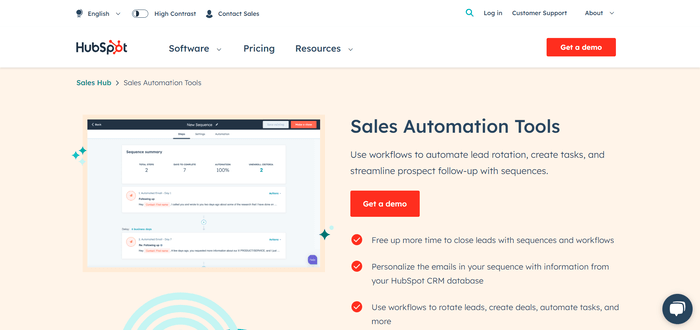
HubSpot is one of the best-known CRM solutions out there — and one of the most comprehensive too, with its marketing, sales, customer service, content management system, and operations products. You can mix and match the various products to create a customized bundle or go for the pre-packaged CRM Suite, which combines all five products together.
Using HubSpot, you can automate actions based on how your contacts interact with your emails. For example, you could send another marketing email as part of an email funnel, add the contact to a list, or add a new task to your HubSpot account. You can also create workflows for automating sales actions such as assigning leads to team members and scoring leads.
A main drawback is that you won’t be able to experience HubSpot’s full automation capabilities on its famed free plan, but will need to take up a paid plan instead. HubSpot’s lowest paid Starter plan also only includes two paid users — and the platform’s prices rise quite dramatically between its Starter and Professional tiers.
Pros of HubSpot CRM
- On the contact management front, HubSpot CRM’s free plan is good for storing up to one million contacts. You can also send up to 2,000 marketing emails per month, and create up to five active lists, for free. Not many other free CRMs we’ve tested offer such generous functionality. (See the limitations on HubSpot’s free automation features below, though.)
- HubSpot offers a wide variety of enrollment triggers and actions for customizing your workflow automations.
- Extensive deal filters let you refine your deals to find those that meet your exact criteria.
Cons of HubSpot CRM
- Sales workflow automations are available only on a paid plan. Free users are also limited to only one automated email per form and up to one email automation action.
- HubSpot CRM performed quite dismally in our email deliverability tests (second from last place in our test of 15 tools).
HubSpot CRM pricing
- Sales Hub: free plan available; paid plans start at $20/month
- CRM Suite: includes all of Hubspot’s products (sales, marketing, service, CMS, and operations tools). A limited free plan is available; paid plans start at $30/month
Learn more about HubSpot pricing here.
Who is HubSpot CRM best suited to?
HubSpot is suited for small businesses that want a range of marketing, sales, and customer service features for their CRM and only need a small number of paid user accounts. (Otherwise, HubSpot will get expensive really fast.)
> Read our full HubSpot CRM review
2. ActiveCampaign
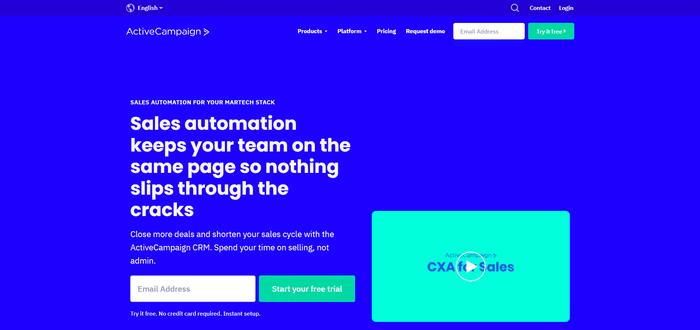
While ActiveCampaign may be more well-known as an email platform, it also has a good range of CRM features for creating pipelines, tracking deals, and automating your marketing and sales processes.
In fact, automation is where ActiveCampaign really excels. In our years of testing CRMs and marketing automation platforms, we’ve never failed to be impressed by the platform’s range of automation triggers and actions, and capabilities for connecting all these.
For example, you can have your automation trigger when a contact replies to an email or when a certain goal is achieved, and then take actions such as updating a custom deal field or sending a follow-up email.
That said, all this automation power will come at quite a high price. ActiveCampaign isn’t the cheapest CRM or marketing automation software in the market, as you’ll see from the prices below.
Pros of ActiveCampaign
- ActiveCampaign’s sales and marketing automation capabilities are among the most extensive we’ve seen. There is no shortage of triggers and actions for putting repetitive sales and marketing tasks on autopilot. The platform can even automatically score contacts for you when certain events occur.
- A machine learning-powered sentiment analysis feature gives you insights into your contacts’ receptiveness toward your emails so you can tailor your next steps accordingly. You can even trigger automations based on sentiment changes.
- The platform has fantastic deliverability, ranking among the top three tools during our regular email deliverability tests.
Cons of ActiveCampaign
- It’ll cost you quite a bit to enjoy the full range of ActiveCampaign’s marketing and sales automations. Other CRM systems we’ve tested, such as EngageBay, offer similar automation features for less (though possibly not to the same level of extensiveness).
- ActiveCampaign phased out its “Conversations” customer service features in January 2023. If you need such features for your CRM, you’ll have to look elsewhere (such as HubSpot or Zoho CRM).
ActiveCampaign pricing
- Sales Plus plan: $23/month for 1 user seat, sales automation, lead scoring, pipeline, account, and deal management.
- Sales Professional plan: $59/month for 1 user seat, sales engagement automation, sentiment analysis, win probability, Facebook lead ads, split automations and automations map.
To gain access to both their CRM and email marketing features, you'll need to purchase a Bundle plan.
Learn more about ActiveCampaign pricing here.
Who is ActiveCampaign best suited to?
You’ll love ActiveCampaign if you need extensive sales and marketing automation tools and have the budget to afford them.
> Try ActiveCampaign in a free trial
> Read our full ActiveCampaign CRM review (or our ActiveCampaign email marketing review here)
3. EngageBay
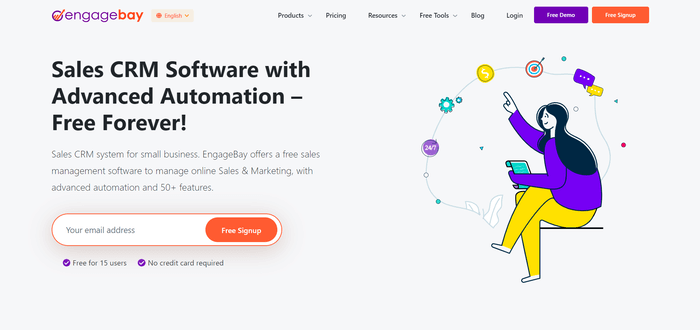
EngageBay helps businesses map their sales cycles’ respective stages, and manage customer data, in a beautifully designed interface. There’s just something about the platform’s pleasant color scheme that makes it a joy to use.
And you’ll find a lot of use for EngageBay too! Automate your marketing and sales tasks with visual automations, track the progress of tasks using a kanban board-style interface, or even call contacts directly from the platform.
Separate CRM data tabs in your contacts’ profiles, such as emails, phone calls, and automations, also make it easy to track your interaction with contacts over various channels and deals.
If you want to automate both your CRM deals and marketing campaigns, go for EngageBay’s All-in-One plan, which provides sales and marketing features in one neat combo bundle. The All-in-One plan is also quite affordable, making it a viable option considering how automations aren’t included in EngageBay’s free CRM.
Pros of EngageBay
- EngageBay’s interface feels snappy and responds quickly when clicked.
- You can create as many pipelines (known as “deal tracks” in EngageBay) as you need. Some other platforms we’ve tested, like HubSpot CRM, impose limits on the number of pipelines you can have in your account.
- Apart from its visual automation feature, EngageBay offers “workflows” that execute a set of actions when you manually run them. They could come in handy for automating ad hoc tasks that don’t meet your automations’ trigger conditions, such as bulk-marking deals as “Won” and removing them from ongoing sales pitch automations. Based on our research, not many other CRMs offer such an ad hoc automation feature.
Cons of EngageBay
- While EngageBay offers a free CRM, you’ll need a paid plan to access the platform’s automation features.
- The platform could provide more app integrations. You could get around this limitation by integrating EngageBay with an automation platform like Zapier or Make, but doing so will take a little more work.
EngageBay pricing
- CRM & Sales Bay: Free for 1,000 contacts. Includes 1,000 emails/month, appointment scheduling, predictive lead scoring, email integration
- Basic: $12.99/month per user for 10,000 contacts and 10,000 emails/month
- Growth: $24.99/month per user for 20,000 contacts and 20,000 emails/month
- Pro: $49.99/month per user for 30,000 contacts and 30,000 emails/month
Who is EngageBay best suited to?
Small business owners who are new to CRMs will find EngageBay an affordable, user-friendly, and comprehensive introduction to the CRM world.
> Learn more in our EngageBay review
4. Salesmate
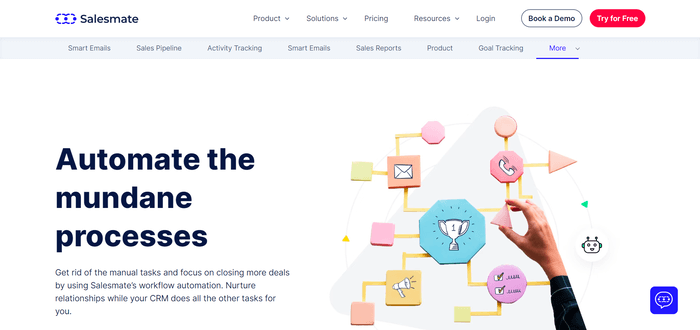
Salesmate offers a clean and user-friendly interface for managing deals and pipelines, calling contacts directly from the platform, and chatting with customers in real time. It also provides plenty of automation features for updating contact information, assigning tasks to team members, and sending marketing emails.
Like Freshsales (which we talk about below), Salesmate provides a mobile app to help keep your sales discussions moving even if you aren’t at your computer. The Salesmate mobile app also includes a business card scanner that can automatically identify and add your contacts’ business card data to your Salesmate account — no manual typing needed.
(You’d need a separate business card scanner app to do the same in Freshsales’s mobile app.)
Pros of Salesmate
- Automation journeys help you automate steps throughout the customer journey using multiple triggers and actions in a visual interface. You can even annotate your automations with markers and stickers to add notes or draw attention to certain aspects of them.
- There are many options for customizing your CRM interface exactly how you want it to look, even on the lowest-tiered Starter plan. Some other CRMs we’ve tested reserve such customizability for their more expensive plans.
- Salesmate offers 30 pre-built reports for adding to your account. You can also design custom reports according to your specifications.
Cons of Salesmate
- There are no automation templates, so you’ll need to build your automations from scratch. You might find this work challenging if you’re new to automations.
- Email scheduling is available only on the second-cheapest Growth plan or higher.
Salesmate pricing
- Starter plan – $15/user/month
- Growth plan – $30/user/month
- Boost plan – $50/user/month
- Enterprise plan – Custom pricing
Who is Salesmate best suited to?
Salesmate’s mobile app makes it a strong choice for always-on business owners that like to take care of business while on the move. Just be prepared to shell out more for automation journeys if you need this feature.
> Try Salesmate in a free trial
5. Pipedrive

Pipedrive pitches itself as “the first CRM designed by salespeople, for salespeople” and I think it has done pretty well in that regard.
Dive deeper into the usual CRM features — like a visual sales pipeline, contacts management, and reports — and you’ll find unique settings (discussed below) that other CRMs may omit, but could make your efforts to close deals so much smoother.
The platform didn’t always provide email marketing features, but a paid Campaigns add-on has changed that. With it, you can send marketing emails to your contacts and automate your emails too.
Pipedrive does still have some kinks to work out in its email marketing offerings though, so let’s hope it gets these sorted out over time!
Pros of Pipedrive
- For greater control over the execution of your automations, you can define whether an automation is triggerable by only you or any other user in the Pipedrive account.
- Pipedrive’s contacts map feature can plot your contacts and deals on a map using their address data. This is useful for identifying opportunities within a certain geographical region, and isn’t a feature we commonly find in other CRMs.
- Creating reports in Pipedrive is straightforward. There are also various chart report types to choose from, such as column, scorecard, and table.
Cons of Pipedrive
- Two-way email sync, which is more or less a must-have when using a CRM, is available only on a higher plan (the Advanced plan and up). Likewise for automations.
- Once you’ve marked an automated campaign as “ready” (this is a requirement for adding the campaign to an email automation), you can’t make further edits to it. You’ll have to duplicate your automated campaign and modify that new copy to do so.
Pipedrive pricing
- Essentials plan: $21.90/month. Includes lead, deal, contact, calendar and pipeline management, and activity reminder notifications
- Professional plan: ($59.90/month). Includes 60 workflow automations, team management, group emailing and the ability to make sales calls directly from the platform.
Learn more about Pipedrive pricing here.
Who is Pipedrive best suited to?
Use Pipedrive if email marketing automations aren’t a priority, but niche sales features — that could make a difference between closing a deal and losing it — are.
> Read our full Pipedrive review
6. Freshsales
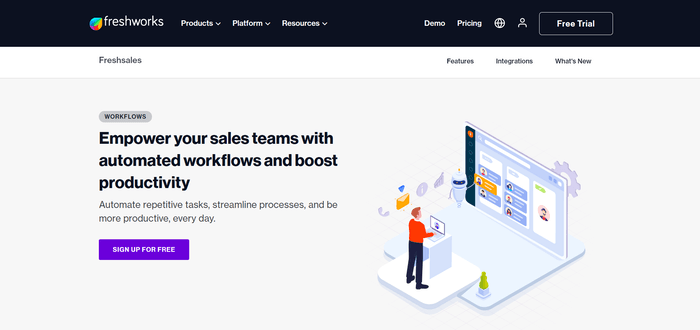
Developed by Freshworks, Freshsales offers standard CRM features such as a visual sales pipeline, deal management, automations, and reports. But there are a couple of things that make Freshsales stand out.
One of them is Freshsales Suite, which is Freshsales with extra email features for designing marketing emails and building email automations. Freshsales Suite has the same starting price as the regular Freshsales product, so opting for the former is a no-brainer if you’re interested in marketing automations.
There’s also the Freshsales mobile app, which is great for managing contacts, accounts, and deals on the go. Not many CRMs we’ve reviewed offer a mobile app.
Finally, with artificial intelligence (AI) being all the rage right now, you may be especially interested in Freshsales’ Freddy AI assistant. In a recent Oracle report, 33% of sellers surveyed shared that they use AI to track deal progress. If you want to be part of that crowd, Freddy can offer deal insights for guiding your next steps — be it to pursue a deal with a high likelihood of closure, or abandon a deal that has gone cold.
Pros of Freshsales
- Freshsales’s built-in Freddy AI assistant helps with scoring contacts, forecasting sales, getting deal insights, advising on the next best action, and more. We didn’t find similar AI assistants in too many other CRMs we’ve tested.
- You can create up to five sales sequences and 20 workflow automations on the free plan, which is quite generous. Some other CRMs, such as Pipedrive, make automations a paid feature.
- The platform can automatically populate your contacts’ profiles with publicly available information such as their social media usernames and display picture. Based on our research, not many CRMs offer a similar auto-enrichment option.
Cons of Freshsales
- Freshsales’ workflow automation feature is somewhat inflexible. For one, each workflow can have only one trigger. You’re also limited to automating actions for one particular module (such as contacts, tasks, and deals) at any one time. On the other hand, other CRMs like ActiveCampaign let you build automations with multiple triggers, and freely automate actions across different modules.
- In contrast to CRMs like EngageBay, there’s no option for filtering your conversations with contacts by communication type (like email and SMS).
Freshsales pricing
- Free: $0/user/month
- Growth: $11/user/month
- Pro: $47/user/month
- Enterprise: $71/user/month
Learn more about Freshsales pricing here.
Who is Freshsales best suited to?
Sales teams keen on improving their close rates with AI will find Freshsales (and its Freddy AI assistant) their new best friend.
7. Zoho CRM
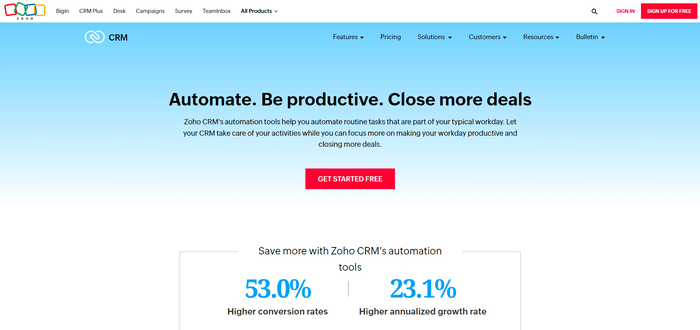
Zoho CRM is but one app in the Zoho suite of business apps. There are also Campaigns for email marketing, Desk for customer service, and Bookings for appointment scheduling to name a few. Many of these apps also offer free plans.
In particular, the free version of Zoho CRM lets you manage leads and deals, set up automated workflow rules, and generate sales reports. You’re just limited to having up to three users in your Zoho account. If you need email marketing features, pair Zoho CRM with the separate Campaigns app.
And if you’re swayed by awards and accolades, you may be interested to learn that Nucleus Research has recently named Zoho CRM as a top CRM for 2023. In doing so, the organization praised the CRM’s usability, compatibility with the full Zoho ecosystem, and customizability, among other strengths.
While I agree Zoho CRM has some strong points, I beg to differ on some of Nucleus Research’s findings.
Pros of Zoho CRM
- Set up lead scoring rules and Zoho CRM will use them to automatically score your leads after that.
- You can create up to 2,500 rules in Zoho CRM, with each rule containing up to 10 conditions for tailoring your customer interactions precisely.
- The wide range of apps in the Zoho ecosystem means you can practically run your business using Zoho apps alone — and be assured that your CRM data will play nice with these.
Cons of Zoho CRM
- Getting the hang of Zoho CRM might take some time. With the sheer number of menu operations and settings available, I find this sales funnel software rather complicated to navigate (unlike Nucleus Research’s opinion on this — sorry!)
- Email marketing automations are available only on the paid tiers of the Zoho Campaigns app.
Zoho CRM pricing
- Free: For up to 3 users
- Standard: $20/user/month
- Professional: $35/user/month
- Enterprise: $50/user/month
- Ultimate: $65/user/month
Learn more about Zoho CRM pricing here.
Who is Zoho CRM best suited to?
If you don’t need CRM access for more than three sales reps, you may find Zoho CRM’s free features a good option.
> Read our full Zoho CRM review
8. Brevo (formerly known as Sendinblue)
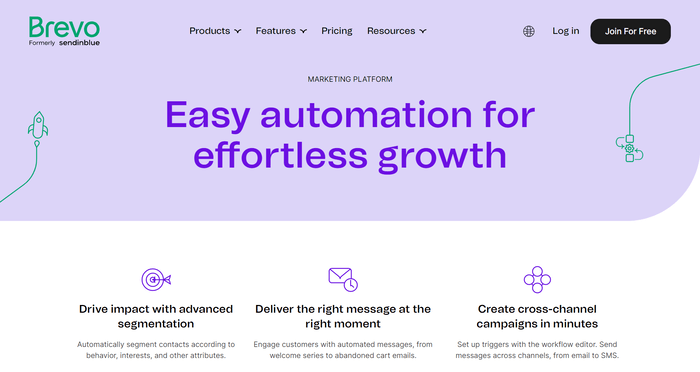
Brev-who? This seemingly new entrant to the CRM scene is actually the popular Sendinblue platform — but rebranded to acknowledge its growth from an email marketing platform to a complete CRM suite over the years. Looks like blue is out and green is in!
Despite the new name and look, Brevo still has all the email marketing and CRM features we love, such as signup forms for email marketing lead generation, unlimited contacts, deal pipeline management, and a free plan for sending up to 300 emails per day.
It’s not the most full-featured CRM in the market, but you’ll be hard-pressed to complain when you can access many key CRM features for free!
Pros of Brevo
- Using Brevo’s free Marketing Platform plan (and adding on its free Sales Platform), you can automatically assign contacts to team members, automate your tasks, and create marketing automations at no cost.
- There is a decent range of marketing automation triggers, actions, and conditions for automating your marketing interactions with contacts.
- I’ve always found Sendinblue user-friendly. But while rebranding to Brevo, the platform has undergone a facelift and become even cleaner and easier to navigate! Bravo! (Couldn’t resist the pun here)
Cons of Brevo
- Brevo can accommodate only one deal currency for pipelines at any one time. In contrast, CRMs like Salesmate and EngageBay can handle multiple currencies in a single pipeline.
- Limited built-in sales reports are available. You’ll have to export your CRM data to conduct detailed analyses of your sales efforts.
Brevo pricing
- Free for 300 emails/day
- Lite: $35/month for 20,000 emails
- Essentials: $49/month for 60,000 emails
Learn more about Brevo pricing here.
Who is Brevo best suited to?
If you’re a small business with a limited CRM budget and that deals in only one currency, you may find Brevo’s free CRM more than suitable for your sales and marketing processes.
9. Drip
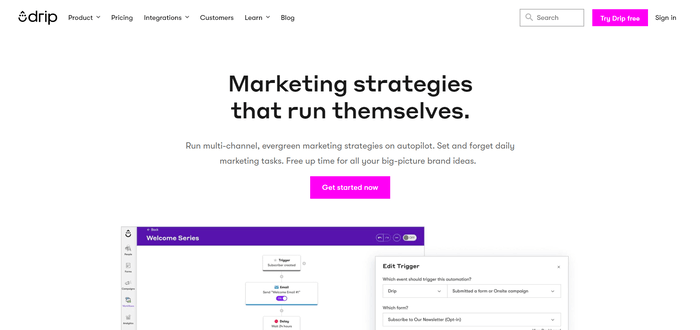
While most of the CRMs covered in this guide tend to be multi-purpose in nature, Drip has dedicated itself to serving ecommerce store owners.
Drip has built-in integrations with Shopify, BigCommerce, and WooCommerce, and also integrates with custom-built stores. Sync it with your store, and it’ll build profiles of your contacts (called “people”) using details such as their name, email address, and order history.
Naturally, Drip’s automations are also ecommerce-focused, helping you send abandoned cart email reminders and product recommendations as customers interact with your store. (Automation templates are available if you need help building your automations.) Drip can also automate behind-the-scenes tasks such as updating a person’s custom field or adding a tag to their profile.
That said, Drip isn’t the most sophisticated CRM system — more info on this below.
Pros of Drip
- You’ll get access to all of Drip’s features even on its lowest-tiered plan. Drip’s pricing increases only if you need to raise your account’s people or monthly email send limits.
- The platform automatically populates your people’s profiles with their order history and customer lifetime value once you’ve connected it to your store.
- With its templates and visual workflow builder, Drip makes setting up ecommerce automations a breeze.
Cons of Drip
- Being more of an email platform than a CRM, Drip has limited CRM capabilities. There are no features for adding deals or visualizing your entire sales funnel even though those are generally standard CRM features.
- Based on our regular email deliverability tests, Drip’s deliverability doesn’t seem the most reliable.
Drip pricing
- Prices start from $39/month for 2,500 contacts and all the features.
Who is Drip best suited to?
Ecommerce owners who need just a simple CRM with automation features will find Drip useful for managing their customers and boosting customer retention.
(If you have more complex CRM needs, however, ActiveCampaign might be a good choice. Learn more in our ActiveCampaign vs Drip review.)
Choosing the Best CRM with Automation for Your Business: What Will It Be?
That’s a lot to take in! Let’s summarize as we wrap up.
From our research, the top CRM with automation tools are:
- Most well-rounded CRM: Pipedrive, Freshsales, and HubSpot CRM
- Best for CRM automation: ActiveCampaign
- Most user-friendly CRMs: EngageBay and Salesmate
- Best free CRMs: Zoho CRM and Brevo
- Best ecommerce CRM: Drip
Be sure to try these CRM automation tools for yourself before committing to any one of them! Signing up for their respective free plans or trials is easy, so take advantage of these to get a taste of the platforms’ capabilities and whether they complement your sales processes.
I’m also happy to help if you have questions — just leave a comment below!
Our Methodology
This article has been written and researched following our EmailTooltester methodology.
Our Methodology



